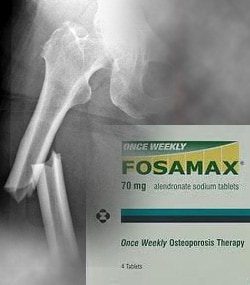
Another woman has filed a lawsuit alleging that her use of Fosamax (alendronate) led to a left femur fracture and other complications. The lawsuit, filed on behalf of the Mississippi woman by national law firm, Parker Waichman LLP, was entered on June 29th in the Superior Court of New Jersey, Atlantic County Law Division (Case […]
 Another woman has filed a lawsuit alleging that her use of Fosamax (alendronate) led to a left femur fracture and other complications. The lawsuit, filed on behalf of the Mississippi woman by national law firm, Parker Waichman LLP, was entered on June 29th in the Superior Court of New Jersey, Atlantic County Law Division (Case No. L4568-12). Defendants named in the case are Merck Sharp & Dohme Corp. and Merck & Co., Inc.
Another woman has filed a lawsuit alleging that her use of Fosamax (alendronate) led to a left femur fracture and other complications. The lawsuit, filed on behalf of the Mississippi woman by national law firm, Parker Waichman LLP, was entered on June 29th in the Superior Court of New Jersey, Atlantic County Law Division (Case No. L4568-12). Defendants named in the case are Merck Sharp & Dohme Corp. and Merck & Co., Inc.
The complaint states that the woman began taking Fosamax, as prescribed, in December 2005. The lawsuit alleges that, in July 2010, she suffered from a left subtrochanteric femur fracture and endured severe mental and physical pain and suffering, permanent injuries, emotional distress, economic loss due to medical expenses, and living related expenses due to a new lifestyle. According to the lawsuit, the woman’s injuries are a result of using Fosamax for several years.
The lawsuit also claims that the Mississippi woman would never have taken Fosamax had she been fully informed about its risks. According to court documents, Merck allegedly was aware that taking Fosamax could result in severely suppressed bone turnover and multiple stress fractures, but never adequately warned consumers or the public.
The U.S. Food and Drug Administration (FDA) approved Fosamax to prevent bone loss due to osteoporosis. Fosamax, along with other drugs such as Actonel and Boniva, is a part of a class of drugs known as bisphosphonates. In October 2010, the FDA updated the label on Fosamax, Fosamax Plus D, and other bisphosphonates, warning about the risk of atypical femur fractures. In addition to atypical femur fractures, bisphosphonates have also been linked to osteonecrosis of the jaw (ONJ) and esophageal cancer.
The FDA also recently published data suggesting that there may be no benefit to taking Fosamax and its sister drugs on a long-term basis. After reviewing data from 2,342 women, the agency stated that there is “little benefit of continued bisphosphonate treatment beyond 5 years.” Another recent study, published in the Archives of Internal Medicine, found that 82 percent of patients with atypical femur fractures had been taking bisphosphonates.
This is not the first lawsuit concerning Fosamax and not the first lawsuit filed on behalf of a patient by Parker Waichman LLP. The national law firm recently filed another lawsuit on behalf of a woman who took Fosamax and subsequently suffered a femur fracture. That lawsuit was filed on June 4th in the Superior Court of New Jersey, Atlantic County Law Division (Case No. ATL-L-3854-12).
Another recent study of adverse event reports involving Fosamax and other bisphosphonates found that the risk of esophageal cancer associated with these drugs may be higher than first thought. Last summer, the FDA issued a Drug Safety Communication to update the public on its ongoing review of the possible association between oral bisphosphonate drugs and an increased risk of esophageal cancer. At that time, the agency noted that the two studies it reviewed had reached conflicting conclusions and, while the FDA said it believed the benefits of bisphosphonates continued to outweigh their risks, it acknowledged that further study of the issue was needed. Its safety review is ongoing.


